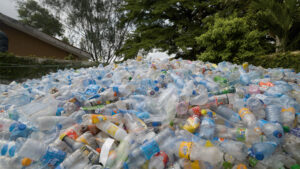Earth Day 2024
Earth Day has come round again, the theme this year is plastic – and an unwavering commitment to end plastics for the sake of human and planetary health.
Earth Day has come round again, the theme this year is plastic – and an unwavering commitment to end plastics for the sake of human and planetary health.
It feels shocking that we are still talking about reducing plastic pollution without any talk of ending it, especially in the UK where we appear to be way behind other nations in our actions. Bangladesh for instance banned plastic bags in 2002, we had to pay to use them from 2015 but it took until last year for them to be fully banned. Whilst other items have had restricted use (straws, stirrers etc) since 2020 it is not until 2042 that the government plan to eliminate all avoidable plastic waster by 2042. It therefore is unsurprising that theme for this years Earth Day is planet v’s plastic.
During the Covid -19 pandemic and the associated lockdown periods we saw a significant change on plastic production, use and waste – use declined as did the reduction in demand and output. This was notable not only in daily household consumption but also in large scale plastic using sectors such as construction, automotive and trade.
The impact on the environment during this time was phenomenal and nature bounced back around the world. The Himalaya’s were visible from India for the first time in decades; The canals in Venice became crystal clear and you could see the fish for the first time in years; dolphins were increasingly braving the Bosphorous, which is normally a busy shipping route; fewer vehicles on the roads saw bees and pollinators enjoy a revival, as well as far fewer injuries for mammals for endangered animals such as hedgehogs. Daily walks meant people appreciated their local environment and wildlife as never before. Does that all seem like a lifetime ago? Those behaviours and sightings disappearing as we have reverted to life before Covid and whilst we are seeing some changes – such as more whales and dolphins around the UK coastline, these astonishing creatures are here due to climate change and impacts on their food distribution.
Back to 2024 and the planet vs. plastic – collective action and the power that it can have means that if everyone did their bit, no matter how small we could look to end plastic consumption.
King Charles himself whilst addressing world leaders in Dubai on climate change last year said: “Dealing with this is a job for us all, change will come by working together and making it easier to embrace decisions that will sustain our world, rather than carry on as though there are no limits”

The end goal of Earthday.org is to get a commitment of 60% reduction in production of all plastics by 2040. We want to go further and make all events plastic free that we work on and reduce the overall impact of your event on the environment. We are not waiting until 2040 we have been doing it already and importantly, we have found that all of our clients who do this also save money on their bottom line too, so it is a win-win all round.
These are some of the actions that we take that can help you achieve a plastic free and more sustainable event:
- Include sustainability in your event planning from the start, it shouldn’t be a nice to have or an afterthought. It should be part of your objectives and KPI’s. Engaging with all stakeholders including delegates increases the buy in and maximising the impact – the power of collective action.
- Measure your carbon footprint and actions from the outset – we can support and manage this with you as we have the tools in place to do so whether your aim is to offset or simply make mindful decisions throughout the lifecycle of the event.
- Engaging your suppliers during the sourcing and procurement process is key. We have our own Supplier (SPQ) that vets suppliers for the environmental credentials before we contract them. Sustainable infrastructure, renewable energy, energy efficiency measures – lighting and heating are all aspects that need consideration when choosing a destination and venue.
- Choose local suppliers where you can reduce transportation and support the local economy.
- Encourage attendees to use public transport or provide coaches to bring people to the location – consider not paying mileage or parking expenses should people decline public transport.
- Create VIP zones at the event for those who have arrived on foot or bike – not only reducing carbon emissions but also promoting employee wellbeing. In these areas we have installed smoothie and juice bars, seated massages, and massage chairs for relaxing in.
- It goes without saying that you must eliminate single use items – request that nothing is supplied wrapped in plastic; cardboard and paper should be recyclable – no plastic coatings; provide refillable water bottles for those that haven’t brought their own and hydration stations (these also provide great branding opportunities!). At a recent Expo we provided all exhibitors and delegates with canned water, that could be resealed as well as fully recycled after use. At Cop 26 we sourced compostable coffee cups that were plant based rather than plastic and put the planet first. The coffee and sugar too were sourced from a sustainable, fair-trade producer and the milk from a local dairy.
- Source local produce and minimise food waste – we have all experienced the ubiquitous conference buffet, with copious amounts of food left at the end. Covid 19 also raised the safety implications of a buffet with shared cutlery also needs to be considered. Why not give delegates the choice of what they would like to eat beforehand and limit the choices/amounts so as to minimise waste. We find having various food stations serving different dishes in limited quantities is always a success and also means you can use local suppliers and really promote farm to fork ethos. One of our clients in the construction industry showed their Senior Leaders the footprint of their 3-course beef dinner, vs a vegetarian alternative – by the end of the dinner they had voted for a vegetarian menu at their next event. That happened before December and there were very few moans!
- Our online event registration systems and event apps, all reduce the need for paper print as well as saving time and money. Our badges when required are all recyclable and contain no plastic. If choosing lanyards we prefer the bamboo ones that again contain no plastic, and those made of recyclable materials. Always make sure lanyards are generic and not event specific to encourage re-use by the delegate.
- Production sets can also be greener choose LED lighting which uses less electricity; project logos and messages onto plain sets which can then be reused; utilising the equipment which the venue already has on-site, will reduce the need for additional transportation – improving the air quality and your budget!
- Signage and Table Plans can all be projected rather than printed, saving on print costs and waste but also it allows for last minute changes which are inevitable on table plans!
- As with lanyards if you have to print anything for the event make sure it is generic, no dates, no event specific messaging so that it can be repurposed after the event again and again!
- Ask any exhibitors to consider what giveaways they bring to the event, nothing plastic and something of use that will not be discarded. We have also implemented this in our office with suppliers visiting – we have asked them not to bring gifts, food or brochures and instead we ask them to make a contribution to our local foodbank.
- Creating a hybrid event model can reduce the impact of travel on the environment whilst still being engaging for all.
The overarching benefit of incorporating all or some of the above is that it will not negatively impact your budget. In fact, by saving the environment you should also reduce your costs.
Finally, there is likely to always be a residual carbon footprint and we partner with Carbon Neutral to help you offset this with one of their projects in the UK or overseas.
So, this Earth Day, lets use our collective voice to take action, it is a pivotal time for our precious earth, but together we can turn things around.
